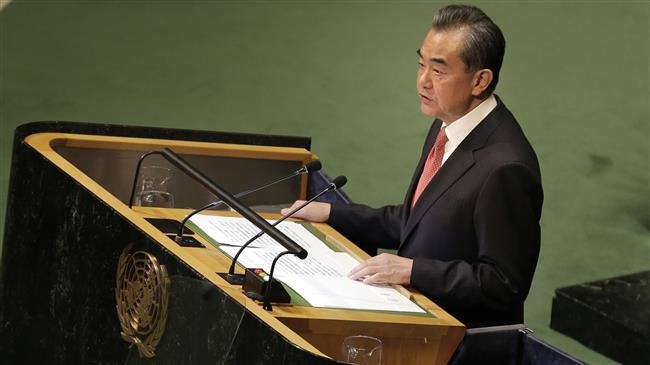

Chinese Foreign Minister Wang Yi says the 2015 nuclear agreement Iran signed with major world powers is beneficial to the entire world and must be upheld.
Speaking at the 73rd annual session of the United Nations General Assembly in New York on Friday, Wang said his country still supports the nuclear agreement, officially known as the Joint Comprehensive Plan of Action (JCPOA), reached between Iran and the P5+1 group of countries in 2015 despite US President Donald Trump’s withdrawal from it.
He added that the multilateral deal was endorsed at the time by the global body’s powerful Security Council.
He emphasized that along with China, Russia, France, Britain and Germany are supporting the deal as it “serves the common interests of all parties concerned and the international community at large.”
Russia to strive to maintain Iran nuclear deal: FM Lavrov
Russian Foreign Minister Sergei Lavrov also on Friday slammed the United States’ move to pull out of the nuclear accord, saying Moscow will do “everything possible” to preserve the JCPOA despite the US withdrawal.
Delivering his speech to the UN General Assembly in New York, Lavrov said Trump’s pullout from the deal was part of a dangerous trend of unilateral measures that risk damaging the post-World War II global order.
The top Russian diplomat emphasized that the US move was a breach of UN resolutions and a threat to stability in the Mideast.
In a statement last month, the Russian Foreign Ministry said that Moscow “continues to consistently implement its commitments under the JCPOA… We reiterate our decisive commitment to take all the necessary measures to preserve and fully implement the JCPOA.”

Trump announced in May that Washington was pulling out of the nuclear agreement which lifted nuclear-related sanctions against Tehran in exchange for restrictions on Tehran’s nuclear program. The deal had been signed between Iran and the five permanent members of the UN Security Council — the United States, Britain, France, Russia and China — plus Germany in 2015.
The US administration reintroduced the previous sanctions while imposing new ones on the Islamic Republic. It also introduced punitive measures — known as secondary sanctions — against third countries doing business with Iran.
A first round of American sanctions took effect in August, targeting Iran’s access to the US dollar, metals trading, coal, industrial software, and auto sector. A second round, forthcoming on November 4, will be targeting Iran’s oil sales and its Central Bank.
In his second address to the General Assembly on Tuesday, Trump urged the world to isolate Iran, accusing it of sponsoring terrorism and sowing “chaos, death and destruction,” in the Middle East.
“We ask all nations to isolate Iran’s regime as long as its aggression continues,” the US president said. “They do not respect their neighbors or borders or the sovereign rights of nations.”
The top Chinese diplomat further warned that if the JCPOA is not implemented, “the international nuclear non-proliferation regime will be undermined” and the authority of the Security Council will be challenged.
Wang urged talks to resolve the issue “through dialogue and consultation” and said “now is a crucial time” for the implementation of the nuclear accord.
French President Emmanuel Macron also on Tuesday called for “dialogue and multilateralism” on Iran.
“What will bring a real solution to the situation in Iran and what has already stabilized it? The law of the strongest? Pressure from only one side? No!” the French leader said.
In an interview with CBS on September 23, British Prime Minister Theresa May said Iran is in compliance with its commitments under the nuclear deal, stressing that the agreement should be kept alive.









